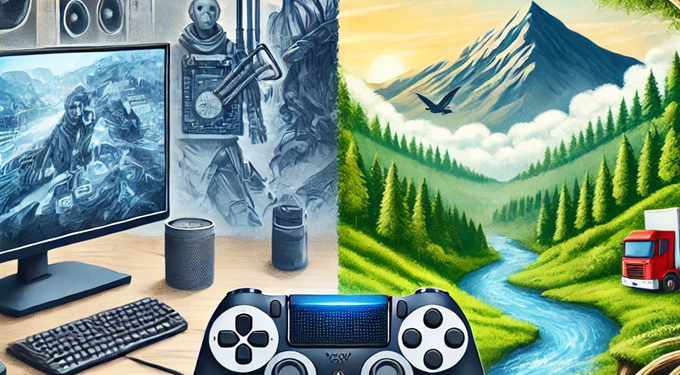Gaming’s rise brings environmental concerns. Online sports betting and other activities demand vast energy resources. The industry’s impact on nature is often overlooked. Servers and data centers consume massive energy. This creates a significant carbon footprint. With gaming’s growth, these issues escalate, pressing the need for sustainable solutions.
The Hidden Environmental Costs of Gaming
Gaming devices contribute to environmental degradation. Manufacturing consoles and computers require rare minerals. These are often mined in sensitive ecological zones. The disposal of outdated electronics adds to e-waste. Toxic substances from e-waste contaminate land and water. The industry’s carbon footprint continues to grow. Addressing these hidden costs is crucial.
Striving for Sustainability in Gaming
The gaming industry faces pressure to reduce its environmental impact. Some companies are innovating in energy-efficient hardware. Others explore carbon offset strategies. Gamers also bear responsibility. Using energy-saving devices can lessen the environmental burden. Recycling old equipment is another step. Collective action is needed for meaningful change.
Nature as Inspiration and Paradox in Gaming
Nature-inspired games often showcase stunning digital landscapes. These virtual worlds celebrate the beauty of ecosystems. Yet, the industry behind them may harm the environment. This paradox highlights a critical challenge. How can developers create immersive experiences without ecological damage? The answer lies in sustainable practices.
The Energy Demand of Gaming
Gaming consumes a lot of energy. Servers run 24/7 to support online games. This constant energy use adds to global emissions. As more people play, this demand only grows. The industry needs to find ways to cut this energy use. Simple steps like using renewable energy can make a big difference.
The Impact of E-Waste
E-waste is a growing problem. Old gaming consoles and computers often end up in landfills. These devices contain harmful chemicals. When they break down, they pollute the soil and water. Recycling old electronics is key. It keeps toxic materials out of the environment. Gamers should think about where their old devices go.
Encouraging Sustainable Gaming Habits
Gamers can help protect the environment. Small actions, like turning off devices when not in use, save energy. Choosing eco-friendly gaming gear also helps. Some companies make products with less environmental impact. By supporting these brands, gamers can drive change. Every choice counts toward a greener future.
The Role of Game Developers
Game developers have a unique role in promoting sustainability. They can design games that raise awareness about environmental issues. By incorporating themes of conservation and ecological balance, games can educate players. Developers can also adopt greener practices in their own operations. This includes using energy-efficient technologies and reducing waste in game production. By leading by example, developers can inspire both the industry and players to care for the planet.
The Environmental Impact of Gaming Servers
Gaming servers consume enormous amounts of energy. These servers operate non-stop to support online games. This constant energy demand significantly contributes to global emissions. As online sports betting and other gaming activities grow, so does this impact.
E-Waste from Gaming Devices
E-waste from gaming devices is a major environmental issue. Old consoles and computers often end up in landfills. These discarded electronics release toxic chemicals into the environment. This pollution harms both land and water. Recycling is crucial to prevent these toxic materials from causing further damage. Gamers should consider the environmental consequences of discarding old devices. Choosing to recycle can help mitigate this growing problem.
Gamers’ Role in Reducing Environmental Impact
Gamers can play a significant role in reducing environmental impact. Small actions, such as turning off devices when not in use, can save energy. Opting for energy-efficient gaming equipment also helps. By choosing products that consume less power, gamers can reduce their carbon footprint. These individual choices contribute to a larger effort to make gaming more sustainable.
The Connection Between Gaming and Nature
Many video games showcase beautiful natural landscapes. These digital environments are inspired by real-world ecosystems. However, the gaming industry’s environmental impact can harm the very nature it celebrates. Game developers have an opportunity to highlight the importance of conservation.
Nature in Virtual Worlds
Many games feature beautiful natural settings. These virtual worlds let players explore forests, oceans, and mountains. But there’s a disconnect. The real-world impact of gaming can harm the nature it celebrates. Game developers can change this. They can design games that teach players about conservation. This can turn gaming into a tool for good.
Building a Sustainable Gaming Industry
The future of gaming should be green. Companies must focus on reducing their environmental footprint. This includes using renewable energy and cutting waste. Gamers, too, can push for change. By choosing sustainable options, they send a message. Together, the industry and its fans can create a future where gaming and nature thrive together.
Toward a Greener Gaming Future
Sustainability must guide gaming’s future. Technological advances should align with environmental stewardship. The industry must innovate beyond gameplay. Gamers, too, can influence change through conscious choices. The intersection of gaming and nature should inspire both innovation and responsibility. A balanced approach will preserve the natural world for future generations.
Do you have a story in your community or an opinion to share with us: Email us at editorial@watchdoguganda.com













